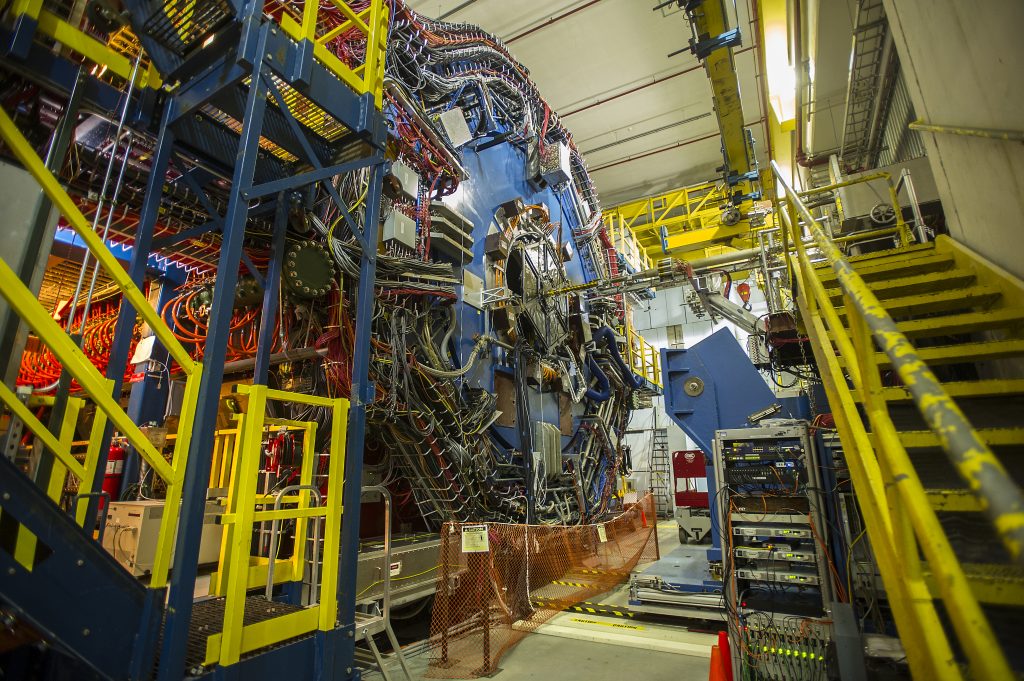Name: Brookhaven National Laboratory – participation of the Czech Republic
Institution: Czech Technical University in Prague
Coordinator: Assoc. Prof Jaroslav Bielčík, Ph.D.; jaroslav.bielcik@fjfi.cvut.cz
Website
Therefore, one of the main goals of BNL-CZ is to enable access to the experimental facilities at RHIC, allowing the continuation of Czech participation in the STAR, PHENIX and sPHENIX experiments, preparation of the ePIC experiment for the future Electron Ion Collider (EIC) and taking part in the development, construction and operations of leading detectors. BNL-CZ also grants access to the RHIC Computing Facility – a large-scale computing centre used for analysing the data collected at RHIC. The research programme at BNL is fully complementary with the research carried out by CERN experiments. In the near future, the focus will be a detailed study of a nuclear matter phase diagram and the search for the critical point. In the long term, after completion of the heavy ion programme, the construction of the EIC will commence in order to study the gluon structure of nuclear matter. BNL-CZ is also directly involved in broad international collaboration with the most prestigious laboratories worldwide, such as LBL (Lawrence Berkeley National Laboratory) in Berkeley, California, USA, LLNL (Lawrence Livermore National Laboratory) in Livermore, California, USA, and ANL (Argonne National Laboratory) in Lemont, Illinois, USA. In ERA, Czech researchers are intensively working on the development and testing of new detector technologies with FAIR (Facility for Antiproton and Ion Research) in Darmstadt, Germany, and High-Luminosity LHC (High-Luminosity Large Hadron Collider) at CERN in Geneva, Switzerland.
BNL-CZ performs the research of nuclear matter and development of detector technologies that push the limits of human knowledge in material physics, astrophysics and medicine. BNL-CZ develops the most modern silicon pixel detectors needed for industry applications in medical diagnostics, as well as radiotherapy, defectoscopy, material fatigue, environment monitoring and nuclear waste control. Collaboration in these applications increases the competitiveness of industrial partners in Czechia. BNL-CZ is an example of good practice of cooperation with the commercial sector to jointly develop technologies for silicon-based semiconducting sensors for particle detection and crystals for calorimeters.
BNL-CZ facilitates access and supports the participation of Czech research teams in BNL (Brookhaven National Laboratory) in Upton, New York, USA. BNL is one of the largest multi-disciplinary laboratories in the world. High-energy heavy-ion collisions are an integral part of modern nuclear physics with importance for other fields, such as condensed matter physics, particle physics, astrophysics and cosmology. BNL-CZ provides access to globally unique scientific instruments, such as the BNL’s Relativistic Heavy Ion Collider (RHIC), National Synchrotron Light Source II and Brookhaven Linac Isotope Producer. Czech researchers have made significant contributions to experiments at RHIC in the exploration of nuclear matter, proton spin structures and the research and development of new detector technologies.
Societal and economic impacts
